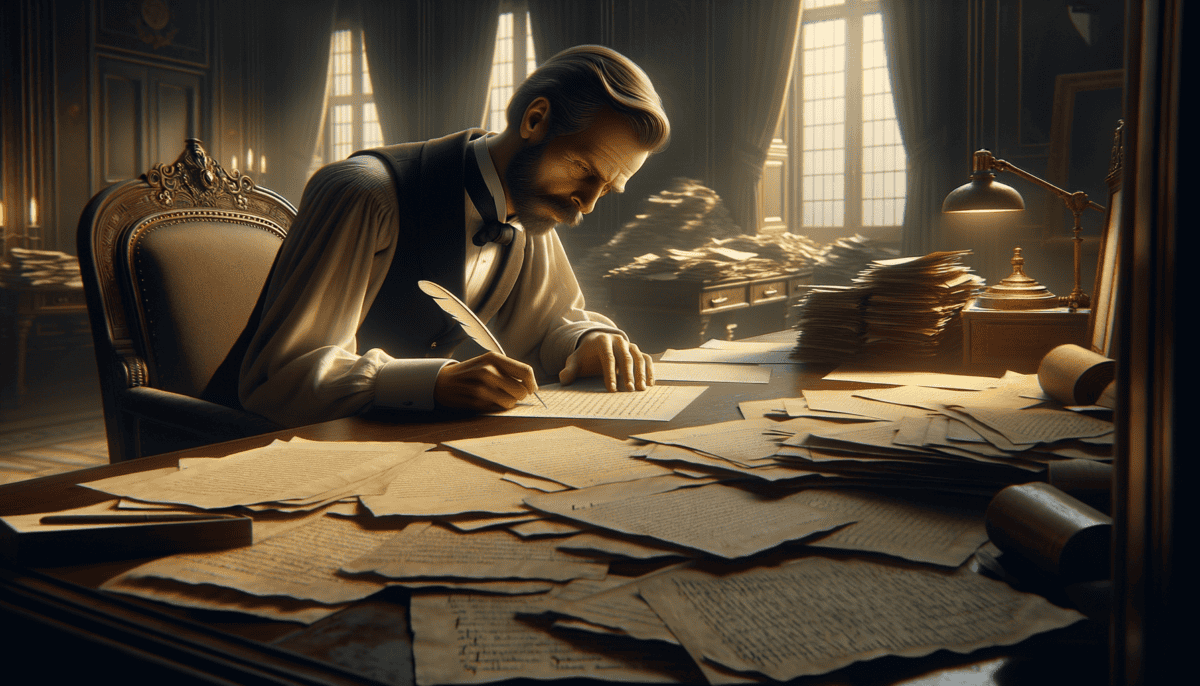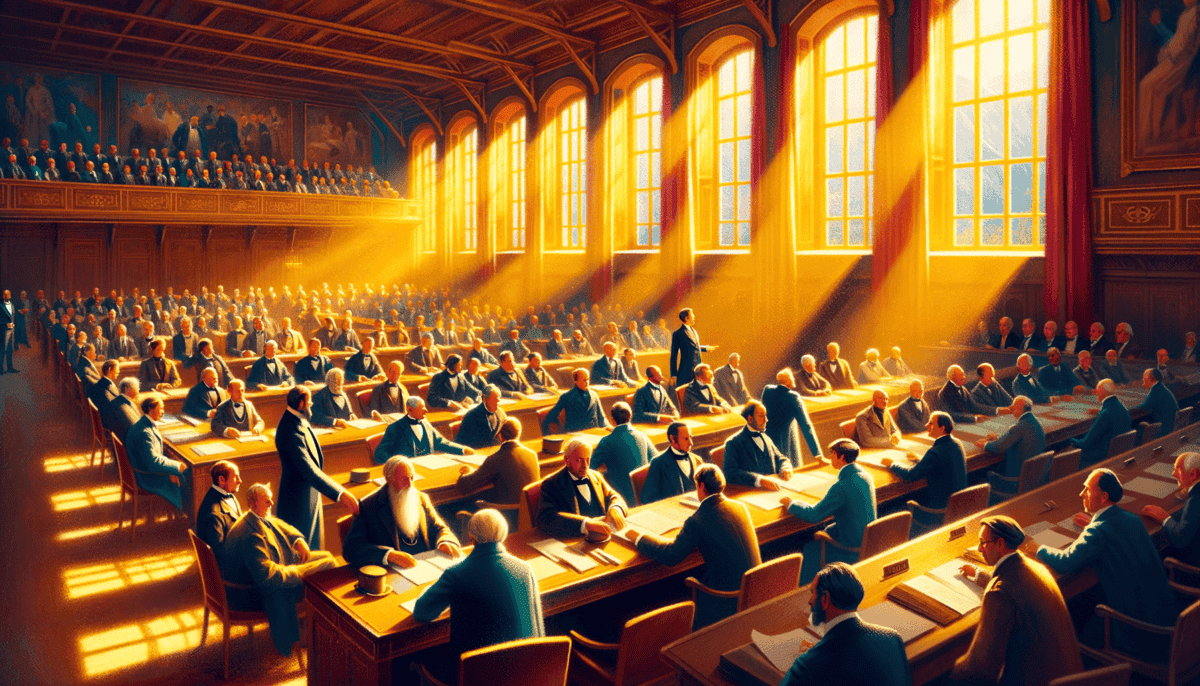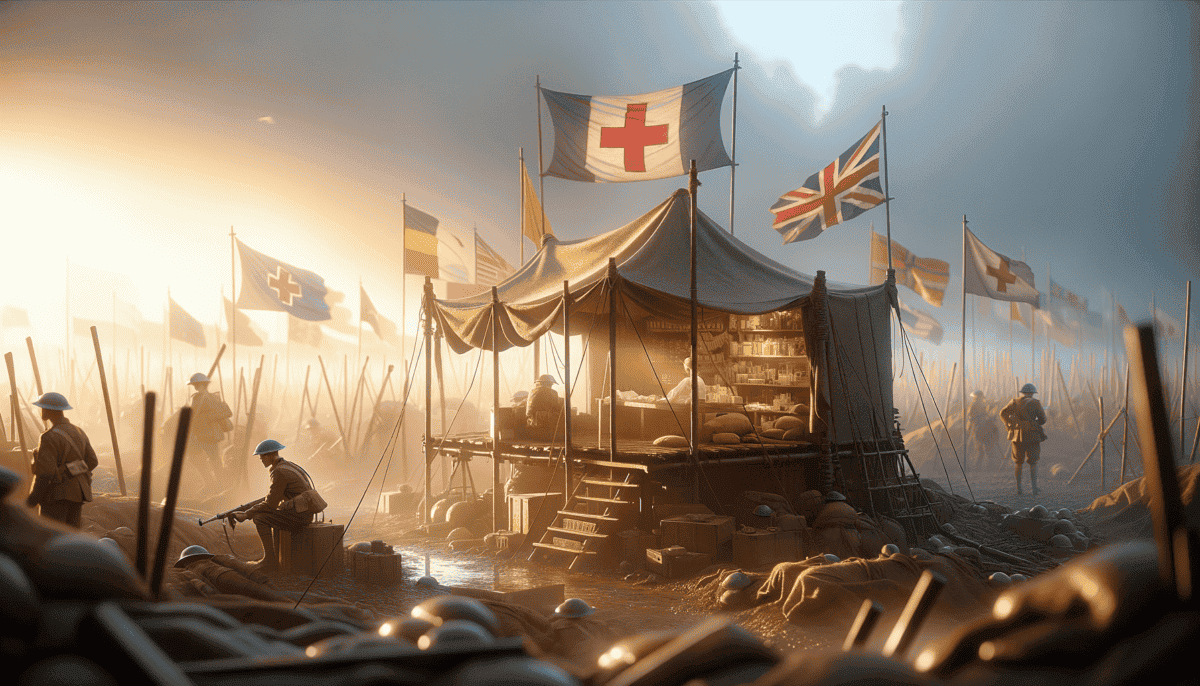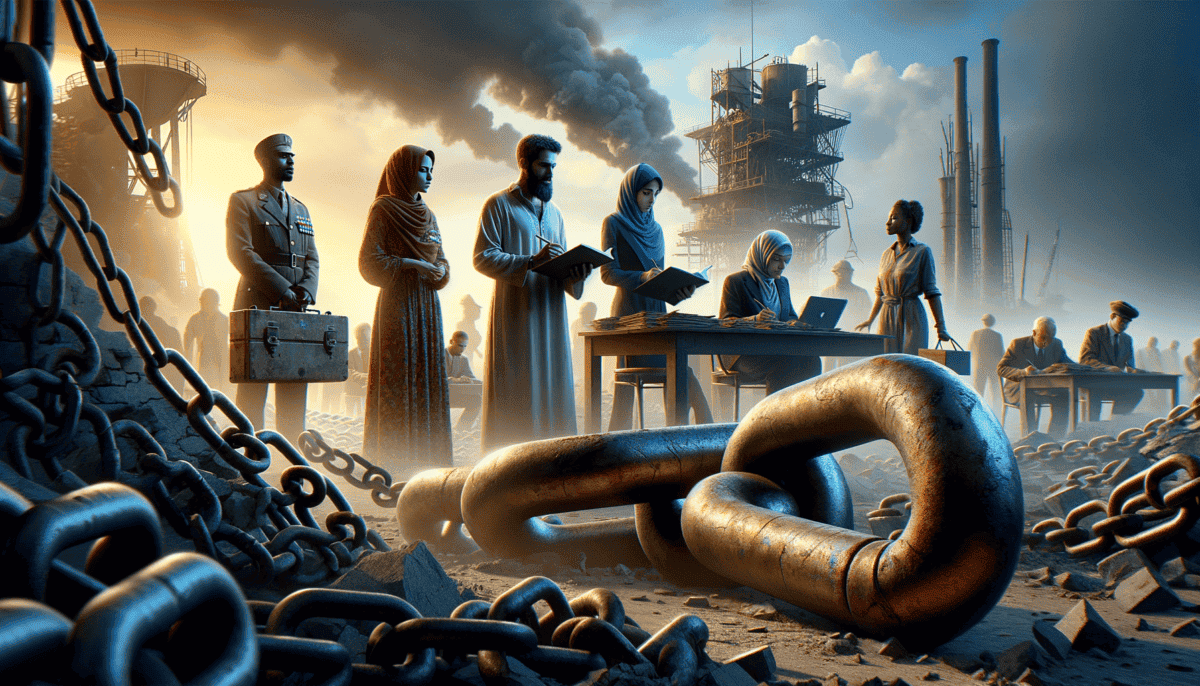A Journey to Solferino
Henry Dunant looked out the window of his bumpy carriage. The summer sun was hot in Italy. He was not supposed to be here. His business trip to meet Emperor Napoleon III had taken an unexpected turn.
"Driver, what is all that noise?" Henry called out.
The sounds of drums and marching feet filled the air. In the distance, smoke rose over the hills near a small town called Solferino.
"A great battle, sir!" the driver shouted back. "The French and Austrian armies are fighting!"
Henry's heart beat faster. He had never seen a real battle before. As they got closer, he could see soldiers running and hear loud booms.
What Henry saw next changed his life forever. Thousands of hurt soldiers lay on the ground. Nobody was helping them. Their red blood stained the grass. Some called out for water. Others cried for their mothers.
"This is terrible!" Henry said. "We must help them!"
He jumped down from his carriage and ran to the nearest soldier. The young man had a deep cut on his arm.
"Water… please…" the soldier whispered.
Henry pulled out his handkerchief and water flask. He cleaned the wound and gave the soldier a drink. But there were so many more who needed help.
A Call to Action
Henry worked for three days straight. He helped both French and Austrian soldiers. He didn't care which side they fought for – they were all human beings who needed help.
"We need more supplies!" he told the local women who came to help. "Bring bandages and water!"
Together, they turned a nearby church into a makeshift hospital. Henry organized the volunteers:
- Some brought water and food
- Others cleaned wounds
- The rest comforted dying soldiers
"In the end, we are all brothers," Henry told a group of volunteers. "War should not stop us from helping each other."
As he worked, an idea began to grow in his mind. Why wasn't there a group of trained helpers ready for battles? Why did wounded soldiers have to suffer alone?
That night, Henry wrote in his journal:
"Something must be done. We need permanent helpers for war. They must be neutral – helping everyone who is hurt, no matter what side they fight for."
The sights and sounds of Solferino stayed with Henry. The moans of dying men. The smell of gunpowder. The red crosses they painted on the church door so soldiers would know it was a safe place.
As his carriage finally left Solferino, Henry made a promise to himself. He would tell the world what he had seen. He would make sure no wounded soldier was ever left alone again.
His hands were still stained with blood, but his heart was full of purpose. The battle had shown him his true mission in life. It was time to change how the world treated wounded soldiers.
The wheels of his carriage kicked up dust as he headed home to Switzerland. But Henry wasn't thinking about his business anymore. He was planning something much bigger – something that would help people all over the world.
Seeds of Change
Back in Geneva, Henry couldn’t sleep. Pictures of hurt soldiers filled his mind. He sat at his desk night after night, writing about what he saw.
“I must tell everyone,” he said to himself. “Things need to change.”
His hands shook as he wrote about the battle. He described the brave local women who helped him care for the wounded:
“Tutti fratelli,” they would say in Italian – “We are all brothers.”
A Book That Shocked the World
Henry wrote a small book called “A Memory of Solferino.” He used his own money to print it. Then he sent copies to kings, queens, and important people all over Europe.
• Every country should have a group of helpers ready for war
• These helpers should help ALL wounded soldiers
• They should wear a special sign so everyone knows who they are
Some people didn’t like Henry’s ideas.
“War is war,” they said. “We can’t change it.”
But others listened. They saw that Henry was right.
Building a Dream Team
Henry met four other men who wanted to help. They formed a small group called the “Committee of Five.”
“We need rules to protect hurt soldiers,” Henry told them. “And we need special helpers who will be there when fighting starts.”
The committee worked hard. They wrote letters. They had meetings. They talked to important people.
Many people laughed at their ideas. But Henry didn’t give up.
“Remember the soldiers,” he would say. “Remember their pain. We must help them.”
A Sign of Hope
The committee needed a special sign for their helpers. They wanted something everyone would recognize.
“What about a red cross on a white flag?” someone suggested. “Like the Swiss flag, but with the colors switched?”
Everyone loved this idea. It was simple. It was easy to see. And it would become one of the most famous symbols in the world. ❤️
Henry wrote more letters. He traveled to different cities. He told everyone about his plan.
“Imagine,” he would say, “trained helpers at every battle. No more soldiers dying alone. No more crying for water with no one to help.”
Slowly, people started to listen. Kings and presidents wrote back to Henry. They wanted to know more about his ideas.
The seed that was planted in Solferino was starting to grow. Henry’s dream of helping wounded soldiers was becoming real.
But there was still much work to do. The committee needed to convince countries to work together. They needed to write rules that everyone would follow.
Henry looked at the red cross symbol on his desk. Soon, this little sign would give hope to people all over the world. But first, they needed to make it official.
Rules for Peace
The summer sun shone bright in Geneva as leaders from many countries gathered. The year was 1864, and something big was about to happen.
A Special Meeting
“Welcome, friends,” Henry said, looking at the room full of important people. “We are here to make history.”
Sixteen countries sent their best helpers. They sat around a big table with papers and pens. Everyone wanted to make rules to help soldiers who got hurt in wars.
• Doctors and nurses must be safe in war
• Hurt soldiers get help, no matter which side they’re on
• The red cross symbol means “Don’t attack – we’re here to help”
• Ambulances and hospitals must be protected
Making New Friends
Countries that used to fight each other now worked together.
“These rules will save many lives,” said a French leader.
“Yes,” agreed someone from Prussia. “Our soldiers deserve care when they’re hurt.”
Henry watched with tears in his eyes. His dream was coming true!
The Red Cross is Born
While the leaders talked about rules, Henry and his friends started something special. They called it the International Red Cross.
This new group would train helpers and be ready when wars started. They would wear the red cross symbol and help everyone who was hurt.
“We need brave people,” Henry told them. “People who will help others even when it’s dangerous.”
“The Red Cross will be like a light in the darkness,” one helper said. “When people see our symbol, they will know help is near.”
A Big Day
After many days of talking, the leaders were ready. They picked up their pens to sign the new rules.
“This paper,” Henry said, “will change how wars work forever.”
One by one, they signed their names. The rules they made would be called the First Geneva Convention.
Now, when wars happened, there would be special safe places for doctors and nurses. The red cross symbol would tell soldiers: “Don’t shoot here – we’re helping people.”
Hope for the Future
As the leaders left Geneva, they carried copies of the new rules home. Soon, more countries would join and promise to follow these rules.
Henry smiled as he watched them go. He remembered the hurt soldiers at Solferino. Now, things would be different. Now, there would be help.
“This is just the beginning,” he thought. “We have much more work to do.”
The red cross flags waved in the summer breeze. A new chapter in history had started. And it all began because one person cared enough to help. ❤️
War Changes Everything
The world turned dark in 1914. Big guns boomed across Europe. This was World War I, and it was different from any war before.
New Ways of Fighting
Marie, a young Red Cross nurse, looked at the sky with worry. Metal birds called airplanes dropped bombs from above. Soldiers used new weapons that could hurt many people at once.
“The old rules aren’t enough anymore,” she told her friend John, a doctor. “We need to do more to help.”
“You’re right,” John said. “War has changed, and our rules must change too.”
Helping Prisoners
The Red Cross workers saw something new that made them sad. Many soldiers were caught and became prisoners of war.
• Prisoners must get enough food
• They must have clean places to sleep
• They can write letters to their families
• Doctors must check if they’re sick
Brave Helpers
Every day, Marie and her friends worked hard. They wore their red cross symbols proudly.
“Look!” a hurt soldier said. “The Red Cross is here to help us!”
Marie cleaned his wounds and gave him water. She didn’t care which side he fought for. That was the Red Cross way.
Making Better Rules
After the war, countries met again in Geneva. They saw that the old rules needed to be stronger. They wrote new rules to protect more people.
“We must protect everyone caught in war,” said an old helper who remembered Henry Dunant’s words.
The new rules said:
– Doctors and nurses must be extra safe
– Hospitals need more protection
– Prisoners must be treated fairly
– Hurt soldiers get better care
A Growing Family
More countries joined the Red Cross family. They opened Red Cross offices in their own lands.
“We are stronger together,” Marie told a group of new helpers. “When we work as one big team, we can help more people.”
Never Giving Up
Even when things got scary, the Red Cross helpers stayed brave. They went where others wouldn’t go. They helped when others couldn’t help.
“Remember why we’re here,” John would say. “We’re here because every person matters.”
The red cross symbol became known everywhere. When people saw it, they knew:
“Here are friends who will help us. Here are people who care.”
The world was changing fast. War was becoming more dangerous. But the Red Cross grew stronger too. They would keep working until everyone was safe. ❤️ ️
Dark Times and Brave Hearts
The year was 1939. Another big war started. This one was even bigger than the last. People called it World War II.
Testing Times
Sarah, a young Red Cross worker, stood in the rain. All around her, cities were broken. More people needed help than ever before.
“We must work harder than ever,” she told her team. “People are counting on us.”
The red cross on her arm gave people hope. When they saw it, they knew help was near.
Writing Down the Bad Things
David was a special helper. His job was to write down when people broke the rules of war. He carried a small notebook everywhere.
• When hospitals got hurt
• When helpers couldn’t do their work
• When prisoners weren’t treated right
• When people didn’t get food or medicine
The World Learns
After the war, people from all over met. They looked at David’s notes and felt sad.
“This must never happen again,” said an old woman who had lived through both wars.
The countries made the rules even stronger. They promised to be kinder to each other.
New Rights for Everyone
Sarah watched as leaders wrote new rules. These weren’t just about war. They were about treating all people with respect.
“Every person has the right to be safe,” they wrote.
“Every person has the right to have food.”
“Every person has the right to be free.”
Helping Everywhere
The Red Cross grew bigger than ever. Helpers went to every corner of the world.
“Look,” a small child said, pointing at Sarah’s red cross. “The nice people are here!”
“We go wherever people need us,” Sarah smiled. “That’s our promise.”
Standing Strong
Even when things were scary, the helpers didn’t give up. They remembered Henry Dunant’s dream from long ago.
“We are all one family,” David would say. “And families help each other.”
The Red Cross symbol now meant more than ever. It stood for:
Hope in dark times ⭐
Help for everyone
Love for all people ❤️
The world had learned hard lessons. But good people everywhere were working to make it better. They wouldn’t stop until every person was safe and happy. ️
A Promise for Tomorrow
Today, brave helpers still work around the world. They wear the red cross just like Henry Dunant dreamed.
Modern Heroes
Maria adjusts her red cross badge and looks at her tablet. She can help people faster than ever before!
“Technology makes our work easier,” she says with a smile, “but our heart is still the same.”
Like Sarah and David before her, Maria goes where people need help. Sometimes it’s after big storms. Other times it’s where people are fighting.
The Rules Still Matter
Tom teaches young soldiers about the Geneva Convention. He makes it simple:
• Be kind to everyone, even if they’re not on your side
• Let doctors help sick people
• Take care of people who can’t fight anymore
• Share food and water with those who need it
New Ways to Help
The helpers use computers and phones now. They can:
Send medicine very fast ✈️
Find lost family members
Tell the world when people need help
Get food to hungry people quickly
Everyone Working Together
Little Ana watches helpers build a new hospital in her town.
“When I grow up, I want to be like you,” she tells Maria.
“Anyone can be a helper,” Maria says. “The world needs more kind hearts.” ❤️
Looking Forward
The Geneva Convention is like a big promise. It says we must be kind, even when things are hard.
“Every day, we write new pages in Henry Dunant’s story,” Tom tells his students. “Every time we help someone, his dream grows stronger.”
The Story Lives On
From that sad battlefield in Solferino to today’s modern world, the red cross still means hope. It shows us that:
One person can change the world
Kindness is stronger than hatred ️
We are all part of one big family
As the sun sets, Maria packs her tablet. Tomorrow brings new chances to help. The spirit of Henry Dunant lives in every helper’s heart.
And somewhere, in a peaceful place, Henry Dunant smiles. His little idea changed the whole world. It taught us all that being kind is the greatest power of all.






